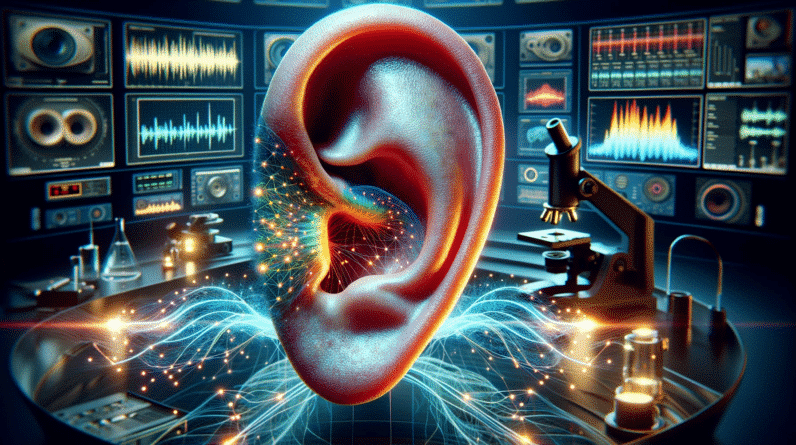
We may earn money or products from the companies mentioned in this post.
As an Amazon Associate I earn from qualifying purchases.
Do you ever hear a ringing, buzzing, or humming sound when no external noise is present? If so, you’re familiar with the phenomenon known as tinnitus. Tinnitus affects as many as 15-20% of people, making it remarkably common. Nonetheless, it remains misunderstood by many. In this article, we’ll delve into what tinnitus is, whether it qualifies as a disease or disorder, and some of the primary causes.
What is Tinnitus?
Tinnitus is a subjective sound that individuals perceive in the absence of an external sound source. Amazingly, no two tinnitus experiences are the same. Some people describe the sensation as a ringing or buzzing sound, while others liken it to the noise of a kettle or even music. Importantly, while tinnitus isn’t a condition in and of itself, it is often a symptom of underlying health issues such as ear injury or a circulatory system disorder. Understanding tinnitus is an essential step towards managing its effects.
Is tinnitus a disease or a disorder?
Often, tinnitus is erroneously labeled as a disease. However, tinnitus is not a disease but rather a symptom of a different disorder. Diseases such as Meniere’s disease or otosclerosis, disorders like temporomandibular joint dysfunction (TMJ), and even certain medications can all act as underlying causes. You should always consult with a health care provider for a comprehensive diagnosis.
Understanding Tinnitus
The mechanisms behind tinnitus are complex, involving many areas of the brain and different neurotransmitter systems. However, most commonly, tinnitus is related to damage to the hair cells within the cochlea, part of the inner ear. Our brain normally receives signals from these hair cells that it interprets as sound. When these hair cells are damaged, the signals can get distorted, resulting in tinnitus.
Most Common Causes of Tinnitus
There are numerous possible triggers for tinnitus ranging from noise exposure to age-related hearing impairment. Some of the most common include noise exposure, whether chronic, like machinery or loud music, or acute, like an explosion. Damage can result in immediate and sometimes permanent tinnitus. Ear infections and excessive ear wax can also produce tinnitus symptoms. Ear infections causing tinnitus are not unusual, particularly in cases where the middle ear is impacted.
It’s also worth noting that certain drugs, such as aspirin, types of antibiotics, and antidepressants, can induce tinnitus in susceptible individuals. But remember – while these conditions can lead to tinnitus, the presence of tinnitus doesn’t necessarily indicate a serious problem. Each person’s tinnitus experience is unique, so if you’re dealing with tinnitus, seek professional help to understand and manage your symptoms.
Tinnitus from Ear Wax
Did you know that something as simple as build-up of ear wax can result in tinnitus? When ear wax accumulates, it can press against the eardrum or block the ear canal, leading to a number of ear-related symptoms, one of which is tinnitus. It can introduce a temporary ringing or buzzing sound in the ear. Fear not, though! This tends to subside once the wax is safely removed, reinstating the blissful quiet. Brush up more on tinnitus from ear wax to get a better grasp of it.
Ear Infection Cause Tinnitus
Another rather common culprit behind tinnitus is ear infection. When the middle ear gets infected, it can induce inflammation and increased pressure in the ear. This interferes with your hearing and can bring about the notorious tinnitus sounds. However, just like with earwax, tinnitus induced by an ear infection is typically temporary. Once the infection clears up, normal hearing is often restored, alleviating the tinnitus. Learn more about how an ear infection cause tinnitus.
Medical Conditions That Cause Tinnitus
Switching gears a bit, it’s not always as simple as wax or an infection. Tinnitus can indeed be linked to a variety of medical conditions, some of which can be quite serious. From Meniere’s disease and acoustic neuroma to hypertension and allergies, the list of medical conditions that can cause tinnitus is extensive. The onset of tinnitus could be your body’s way of telling you something is off. Therefore, medical consultation is often recommended to rule out any severe conditions that cause tinnitus.
Underlying Causes of Tinnitus
Stepping away from the most common causes, it’s important to explore the terrain of less frequent culprits. Certain medications, for instance, are ototoxic – meaning they can cause damage to your auditory system, leading to tinnitus. These include specific antibiotics, diuretics, cancer medications, and even high doses of aspirin. Additionally, a range of diseases and disorders can bring about tinnitus, such as thyroid abnormalities, fibromyalgia, and even Lyme disease. To navigate this complex landscape, head over to our detailed guide on the Underlying Causes of Tinnitus.
Remember, a key resource like the American Tinnitus Association can provide an abundance of information on the different causes of tinnitus.
Diseases That Cause Tinnitus
Did you know there are specific diseases quite notorious for their link to tinnitus? Chief among them are Otosclerosis and Ménière’s disease. Otosclerosis is a disease where an abnormal growth of bone in the middle ear disrupts normal hearing capabilities, and tinnitus often accompanies it. Ménière’s disease, on the other hand, is an inner ear disorder caused by a buildup of fluid and changing pressure in the ear that can cause episodes of vertigo and tinnitus. If you’re interested in more specifics, there’s a spectrum of Diseases That Cause Tinnitus you might like to explore.
Is Tinnitus a Medical Condition?
A common misconception is that tinnitus is a disease or a medical condition itself. But truth be told, tinnitus is neither. It’s a symptom, an indication that something may be wrong in your auditory system— be it in the ear, the auditory nerve that connects the inner ear to the brain, or the parts of the brain that interpret sound. It’s a signal that demand’s one’s attention for further exploration of potential underpinning issues, both physical and mental.
Could Tinnitus Lead to Other Health Issues?
While tinnitus itself is a symptom, not a disease or condition, if left unaddressed it can contribute to various health issues. It can lead to sleep disturbances, difficulty concentrating, memory problems, stress, anxiety, and depression over time. In fact, there’s an observed vicious cycle where the stress over tinnitus can make the tinnitus seem even worse, adding to the distress. Always remember, recurrent tinnitus that disrupts your quality of life should not be shrugged off. There’s a wealth of resources to help understand the complexities around it.
Etiology of Tinnitus
The etiology, or cause, of tinnitus is multifactorial. As we mentioned earlier, it can stem from a host of different issues, from ototoxic medications and ear infections to more serious diseases like otosclerosis and Ménière’s. Lifestyle factors like exposure to loud noises can also lead to tinnitus. To add to the complexity, in many cases, identifying a single cause can be challenging with multifaceted factors playing in. Navigating the causes and mechanisms of tinnitus can be a journey, but insights from professionals and credible sources, like [WebMD] , can make the journey less daunting.
Conclusion
Wrapping up, we’ve embarked on a fairly comprehensive exploration of tinnitus, haven’t we? We elucidated what tinnitus is and addressed some common misconceptions, specifically that tinnitus is a disease or disorder. Spoiler, it isn’t! Instead, it’s a symptom, a signal of possible underlying conditions tied to your auditory system.
We delved into the most common causes – noise exposure, blockage from ear wax, and ear infections, to name a few. However, we didn’t stop there. True, these are frequent culprits, but tinnitus often demands a more nuanced understanding. Stepping into this domain, we discussed the plethora of medical conditions and diseases, from ototoxic medications and Meniere’s disease to the rare cosmos of Lyme disease and fibromyalgia that could be stirring the waters.
But is untangling this jumbled maze crucial? Most definitely. Remember, while tinnitus is a symptom and not a calamitous disease, ignoring tinnitus or attributing it to the ‘inconveniences of life and aging’ isn’t advisable. Persistent tinnitus that interferes with your quality of life may be a symptom of undiagnosed medical conditions. Even if it doesn’t point towards alarming issues, addressing it can significantly bolster the quality of your life.
Thankfully, professional help is within reach. As we discussed, tinnitus can be complex, impacted by a multitude of underlying causes and conditions. However, professionals trained in audiology or otolaryngology can navigate these for you, guiding you towards suitable therapy and interventions. Best Doctor for Tinnitus is an excellent place to start looking for a skilled professional.
Conditions That Cause Tinnitus - Frequently Asked Questions (FAQ)
Tinnitus can be caused by a variety of health conditions. These conditions can include ear conditions like otosclerosis or Ménière’s disease, cardiovascular conditions like high blood pressure or anemia, metabolic conditions like diabetes or thyroid issues, neurological conditions like migraines or multiple sclerosis, and psychological conditions like stress or anxiety. Various medications can also cause tinnitus as a side effect. For a comprehensive analysis, visit our page on medical conditions that cause tinnitus.
Yes, tinnitus is often a symptom of an underlying condition. Usually, it’s associated with a variety of ear disorders, such as persistent ear infections or injuries, or it can be a side effect of medications. It can also be a symptom of serious diseases like otosclerosis and Ménière’s disease. Sometimes, tinnitus is the initial sign of hearing loss in older people. For a deeper understanding, learn more about the Underlying Causes of Tinnitus.
Yes, there is a strong connection between tinnitus and both depression and anxiety. Living with persistent, intrusive noise can be stressful and anxiety-inducing, which over time can lead to depression. Furthermore, both depression and anxiety have been identified as potential causes of tinnitus, creating a vicious cycle for individuals suffering from these conditions. For a well-rounded discussion on the topic, you can read about Depression and Anxiety Secondary to Tinnitus.
While there’s no specific diet for tinnitus, certain dietary changes can potentially help manage symptoms. Many individuals find that caffeine, alcohol, and high-sodium foods may intensify their tinnitus. On the other hand, a healthy diet rich in fruits, vegetables, lean proteins and healthy fats can promote overall health and wellness, which may help manage tinnitus symptoms. For more details on how to manage tinnitus, visit our FAQs about tinnitus.
Amazon and the Amazon logo are trademarks of Amazon.com, Inc, or its affiliates.
No related posts.






7 Comments